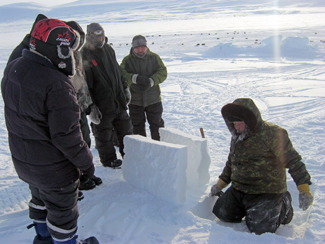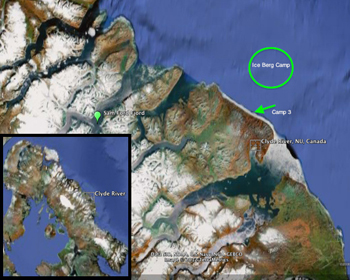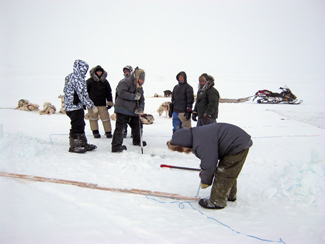Editorial: A dog for all seasons
The Fan Hitch Web and Journal Updates
Fan Mail
The Doggy Men Goes Digital
In the News
Tumivut: Healthy Diet for Dogs
Qimmivut (Our Dogs)
Media Review: Nunavut Quest: Race Across Baffin
Nunavutquest.com Update
The Chinook Project Returns to Labrador
Sirmilik
IMHO: Save the... (fill in the blank)
Navigating This Site
Index of articles by subject
Index of back issues by volume number
Search The Fan Hitch
Articles to download and print
Ordering Ken MacRury's Thesis
Our comprehensive list of resources
Defining the Inuit Dog
Talk to The Fan Hitch
The Fan Hitch home page
ISDI home page
Editor's/Publisher's Statement
Editor: Sue Hamilton
Webmaster: Mark Hamilton
The Fan Hitch, Journal of
the Inuit Sled Dog, is published four times
a year. It is available at no cost online
at: https://thefanhitch.org.
The Fan Hitch welcomes your letters, stories, comments and suggestions. The editorial staff reserves the right to edit submissions used for publication.
Contents of The Fan Hitch are protected by international copyright laws. No photo, drawing or text may be reproduced in any form without written consent. Webmasters please note: written consent is necessary before linking this site to yours! Please forward requests to Sue Hamilton, 55 Town Line Rd., Harwinton, Connecticut 06791, USA or mail@thefanhitch.org.
This site is dedicated to the Inuit Dog as well as related Inuit culture and traditions. It is also home to The Fan Hitch, Journal of the Inuit Sled Dog.
The Fan Hitch welcomes your letters, stories, comments and suggestions. The editorial staff reserves the right to edit submissions used for publication.
Contents of The Fan Hitch are protected by international copyright laws. No photo, drawing or text may be reproduced in any form without written consent. Webmasters please note: written consent is necessary before linking this site to yours! Please forward requests to Sue Hamilton, 55 Town Line Rd., Harwinton, Connecticut 06791, USA or mail@thefanhitch.org.
This site is dedicated to the Inuit Dog as well as related Inuit culture and traditions. It is also home to The Fan Hitch, Journal of the Inuit Sled Dog.

Aisa Piungituq demonstrates the proper way to cut snow blocks
to make an igloo. Right to left: Aisa Piungituq (kneeling), Jaypitee Killiktee,
Joe Aipellee, Damien Kuniliusie, unidentified, Sam Palituq
Photo: Jose Piungituq
Qimmivut (Our Dogs)
by Jake Gearheard
Executive Director
Ilisaqsivik Society
Clyde River, Nunavut
Every winter Ilisaqsivik Society1 in Clyde River2, Nunavut, organizes a dog teaming workshop for youth. The objective of this program is to promote mental, spiritual, and physical well-being and teach Inuit Qaujimajatuqangit (IQ) – Inuit traditional knowledge - skills and societal values associated with harvesting, traveling, working with dogs, camping, being on the land, leadership, working together, problem solving and environmental stewardship. The length of the workshop varies from year to year and depends mostly on the level of support from funders. This year, thanks to financial support from the Qikiqtani Inuit Association and the Government of Nunavut’s Department of Health and Social Services, we were able to run the project for eight weeks during the months of January through March 2012. Eight dog team drivers/instructors, seven skidoo support drivers/instructors and over twenty youth participated in the workshop.
Imagine, eight weeks on the land dog teaming and harvesting every day during January, February and March. During these months it is cold, between -30C and -45C (-22F to -49F), and it is often very windy in the Clyde River area. Wind chills this time of the year can be -50C to -70C (-58F to -94F). These are also the dark months. The sun starts to come back sometime around the end of January, but it takes time to rule the day again and most work and travel happens in the twilight.
Eight weeks is a long time to be out on the land camping and working in these conditions, especially when you are a youth just learning the ropes. There is very little room for error and a lot of energy and concentration must be dedicated simply to keeping warm and being efficient. For all of these reasons, the Qimmivut workshop this year really challenged participants and instructors to help each other and work together, learn new skills and gain knowledge, be resourceful and tenacious and respect the environment. All of these are examples of Inuit societal values that are transferable to all aspects of the participants' lives.

image: Google Earth
The program this year was an amazing and a life changing experience for everyone involved.
Here is an overview of the workshop schedule:
Weeks 1 and 2: Harvesting seal along the way, Qimmivut traveled to a lake near Sam Ford Fjord to ice fish.
Weeks 3 through 6: Qimmivut set up camp in an area of icebergs in the sea ice off the coast and harvested seal. Seal is a primary and very important food source for both people and dogs. We eat mostly ring seal and make clothing and kamiks from the skin. We use bearded seal to make dog harnesses, whips, leads, ropes, etc. All kinds of seal are excellent for dog food. We harvest seals in the winter by waiting at seal breathing holes and either shooting or harpooning them. A lot of patience is required to stand at a seal breathing hole. It is necessary to be completely still, without even shifting your weight. Sometimes you can wait 30 minutes or even an hour like this. We also set nets under the ice and harvest seals this way. Normally dog teamers have several nets that they check every day or every other day. Setting and checking seal nets is no easy task either. Imagine chipping your way through several feet of ice and working with wet and tangled nets in the twilight while the wind is blowing and it is -30C (-22F).
Weeks 7 and 8: Qimmivut spent time at a coastal camp near the community, again harvesting seals in order to feed people and dogs.

Setting up seal nets near Clyde River.
Left to right: Jaime Kautuq, Poasie Palluq, Jusa Iqaqrialu,
Joe Aipellee, Kelvin Illauq, Amosie Sivugat, Aisa Piungituq
Photo: Josie Piungituq
Qimmivut is an example of how for Inuit, dog teaming is more than dog teaming. Working with dogs is at the heart of Inuit culture and the knowledge needed for working with dogs is rich and in so many ways deeply meaningful to those who practice it. Passing this knowledge and practice on to youth today is not only about giving them the skills to run their own working dogs, but also the abilities that transfer to all aspects of living a good, healthy life.
If you would like to support Qimmivut or other programs at Ilisaqsivik, you can send a tax deductable donation to Ilisaqsivik Society at P.O. Box 150, Clyde River, Nunavut, X0A 0E0. Canadian Charity Registration #886642692RR000. Thank you.

Poasie Palluq, one of the participants in the Qimmivut program
is seen here on his way back from checking seal nets.
Photo: Ilisaqsivik Society
1Ilisaqsivik Society is a non-profit, community initiated and community based Inuit organization in Clyde River, Nunavut, dedicated to promoting community wellness. Ilisaqsivik provides space, resources and programming that enables families and individuals to find healing and develop their strengths. Ilisaqsivik operates the Community and Family Resource Centre and the Ittaq Heritage and Research Centre in Clyde River.
2Clyde River is a small, fly in, Inuit community on the northeastern coast of Baffin Island. The population is about 1,000 and is approximately 95% Inuit.